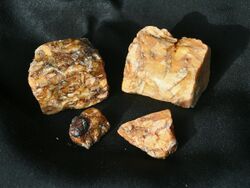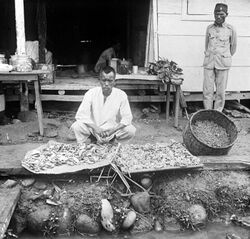Benzoin (resin)
Topic: Chemistry
 From HandWiki - Reading time: 5 min
From HandWiki - Reading time: 5 min


Benzoin /ˈbɛnzoʊ.ɪn/ or benjamin (corrupted pronunciation)[1] is a balsamic resin obtained from the bark of several species of trees in the genus Styrax. It is used in perfumes and some kinds of incense and as a flavoring and medicine (see tincture of benzoin). It is distinct from the chemical compound benzoin, which is ultimately derived chemically from benzoin resin; the primary active ingredient of benzoin resin is actually benzoic acid, not benzoin.
Benzoin is sometimes called gum benzoin or gum benjamin,[2] and in India Sambrani or loban, though loban is, via Arabic lubān, a generic term for frankincense-type incense, e.g., fragrant tree resin.[3][4] The syllable "benz" ultimately derives from the Arabic lubān jāwī (لبان جاوي, "frankincense from Java").
Benzoin is also called storax, not to be confused with the balsam of the same name obtained from the Hamamelidaceae family.
Benzoin is a common ingredient in incense-making and perfumery because of its sweet vanilla-like aroma and fixative properties. Gum benzoin is a major component of the type of church incense used in Russia and some other Eastern Orthodox Christian societies, as well as Latin Catholic churches.[5] Benzoin is used in the Arabian Peninsula and Hindu temples of India , where it is burned on charcoal as an incense. It is also used in the production of Bakhoor (Arabic بخور - scented wood chips) as well as various mixed resin incense in the Arab countries and the Horn of Africa. Benzoin is also used in blended types of Japanese incense, Indian incense, Chinese incense (known as Anxi xiang; 安息香), and Papier d'Arménie as well as incense sticks.
There are two common kinds of benzoin, benzoin Siam and benzoin Sumatra. Benzoin Siam is obtained from Styrax tonkinensis, found across Thailand, Laos, Cambodia, and Vietnam. Benzoin Sumatra is obtained from Styrax benzoin, which grows predominantly on the island of Sumatra.[6] Unlike Siamese benzoin, Sumatran benzoin contains cinnamic acid in addition to benzoic acid.[7] In the United States, Sumatra benzoin (Styrax benzoin and Styrax paralleoneurus) is more customarily used in pharmaceutical preparations, Siam benzoin (Styrax tonkinensis etc.) in the flavor and fragrance industries.[8]
In perfumery, benzoin is used as a fixative, slowing the dispersion of essential oils and other fragrance materials into the air.[6] Benzoin is used in cosmetics, veterinary medicine, and scented candles.[7] It is used as a flavoring in alcoholic and nonalcoholic beverages, baked goods, chewing gum, frozen dairy, gelatins, puddings, and soft candy.[9]
In anesthesia and surgery, it is used as an adhesive to secure wound and catheter dressing and is available as a sterile preparation. [10]
See also
References
| Wikimedia Commons has media related to Benzoin (resin). |
- ↑ Wedgwood, Hensleigh (1855). "On False Etymologies". Transactions of the Philological Society (6): 67. https://babel.hathitrust.org/cgi/pt?id=uc1.b3924121;view=1up;seq=77. Retrieved 2018-09-22.
- ↑ C. F. Leyel (2007). Herbal Delights. Health Research Books. p. 242. ISBN 9780787314125. https://books.google.com/books?id=3d1hFvS3L7oC&pg=PA242. Retrieved 2020-09-21.
- ↑ A. Dietrich (1986), "LUBĀN", The Encyclopaedia of Islam, 5 (2nd ed.), Brill, p. 786a
- ↑ Thomas Kinkele (30 Jun 2005). Incense and Incense Rituals. Lotus Press. p. 117. ISBN 9788180565298. https://books.google.com/books?id=TXDsIun1ovwC&pg=PA117. Retrieved 21 September 2020.
- ↑ St. Alban Blend
- ↑ 6.0 6.1 Karl-Georg Fahlbusch (2007), "Flavors and Fragrances", Ullmann's Encyclopedia of Industrial Chemistry (7th ed.), Wiley, p. 87
- ↑ 7.0 7.1 Klemens Fielbach; Dieter Grimm (2007), "Resins, Natural", Ullmann's Encyclopedia of Industrial Chemistry (7th ed.), Wiley, p. 4
- ↑ Duke, James A. (2007). Duke's Handbook of Medicinal Plants of the Bible. CRC Press. p. 446. ISBN 978-0-8493-8203-1. https://books.google.com/books?id=UcLYLpwdcm8C. Retrieved 2022-04-14.
- ↑ George A. Burdock (2010), Fenaroli's Handbook of Flavor Ingredients (6th ed.), Taylor & Francis, pp. 139–140
- ↑ "Benzoin adhesive". https://www.3m.com/3M/en_US/p/d/v000095028/.
 KSF
KSF